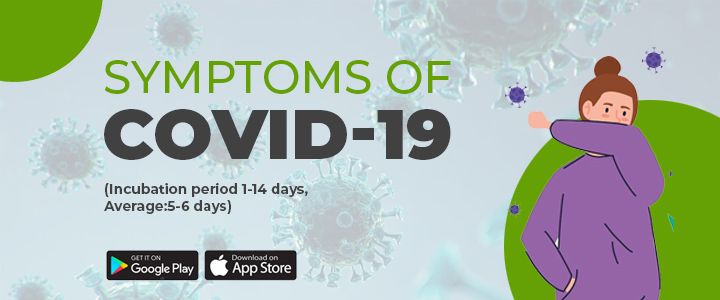
By Dr. Sara
Symptoms of COVID-19:(Incubation period 1-14 days, Average:5-6 days)
Infective Agent: Novel Coronavirus
A feeling of lethargy causing muscle and body aches, sneezing and watery eyes, high-grade fever, dry cough, weakness and difficulty in breathing should make anyone alert of COVID-19.
Elderly above 60 years of age and especially with any preexisting illnesses like heart disease, kidney disease, cancer of any sort, liver disease is Immunocompromised and at high risk. There are recent studies that any age group can be infected. Symptoms may vary from mild to very severe.
Any suspect of COVID-19 must immediately get the lab tests done to check if the person is COVID-19 positive or negative. If the person is positive for COVID-19, he must follow a self-quarantine or isolation of 14 days and keep an eye on the progression of any of the above-mentioned symptoms. If there are very mild symptoms of COVID-19 patient, isolation of 14 days should be strictly completed as the infected person is a carrier of infection. Worsening of any symptoms makes it mandatory that the infected person is shifted to quarantine in a hospital and managed by doctors accordingly.
Treatment at home in Quarantine/Isolation:
-Good rest
-Plenty of fluids
-Keep warm
-Take Vitamin C
-Healthy food
-Antipyretics (to settle fever and pain)
-Use Humidifier if feeling difficulty in breathing, to ease breathing
These measures can be taken if the symptoms are mild.
Common Flu Symptoms;
Human Influenza or flu virus is prevalent in all parts of the world, similarly in Pakistan. The most common season of its prevalence is throughout Fall and Winter but every now and then someone gets it round the year. It causes a wide variety of symptoms varying from tiredness to fever and even pneumonia which is enough for someone to stay away from work. Influenza virus has different types e.g.A, B, C and D. Types A and B can produce severe illness in human beings. Type C produces mild illness. Type D produces disease in cattle but not in human beings.




